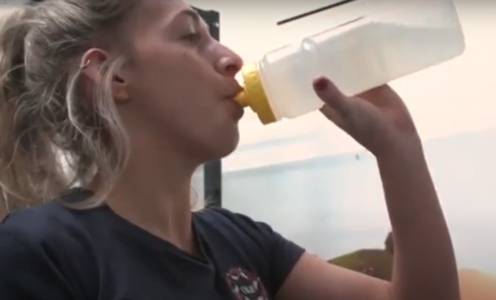Exercising or training in the heat? Remember to stay well hydrated to avoid the risk of injury or illness

Summer is here and with temperatures set to hit the 30s in parts of England this week, it is important to stay hydrated while working out or exercising in the heat.
Dehydration can cause a loss of concentration, negatively effect your energy levels and restrict your body’s performance, increasing the risk of injury. It can also lead to heat illness and, in extreme circumstances, exertional rhabdomyolysis – a muscle breakdown which causes kidney damage as there isn’t enough fluid available to flush out the myoglobin released into the blood.
Harri Cizmic, Lead Strength & Conditioning Coach at the University of Bath, explains: “Studies have shown that a loss of just two per cent of your body weight in water through exercise can negatively affect your performance and your body’s ability to thermoregulate.
“If you haven’t been as active recently because of the lockdown or are used to exercising in an air-conditioned gym, where the environment is well controlled, then you could be at greater risk of injury or illness while training in the heat.
“You should avoid training in excessive heat where you can but if you are exercising on a hot day, you may need to increase your fluid and electrolyte intake more than you would normally.
“Broadly speaking, beginning your training session or exercise fully hydrated and prepared with enough fluids to drink during it is key. Hydrate before you exercise and avoid any drinks associated with a diuretic effect, like coffee or alcohol, that essentially push water out of your system. Some people may rely on caffeine to get the best out of their session but just remember the effect that coffee can have on your hydration status.
“Staying hydrated is also key to the recovery process after exercising, so it is important to replenish the fluids you have lost. One useful method that a lot of training groups based at the University of Bath use is measuring their body weight before and after a session. You do that to monitor your dehydration during the session and can then try to replenish the weight that has been lost before your next session.
“For example, if a 100kg rugby player loses 2kg through sweating while exercising, it would be really important for them to replace it by drinking at least two litres of water across the next 6-8 hours. Aim to drink about 1.2-1.5 litres of fluid for each kg of weight lost.
“Other drinks may be useful in addition to water. Skimmed milk and orange juice have come up in research as beverages that could help retain your hydration status and not lose it as quickly as you might with other drinks.
“Finally, if you do exercise on a hot day and the effects are potentially overbearing, consider taking a cold bath as well as hydrating to help regulate your body temperature.”
For more information about the importance of nutrition and hydration while exercising, check out the following videos:




